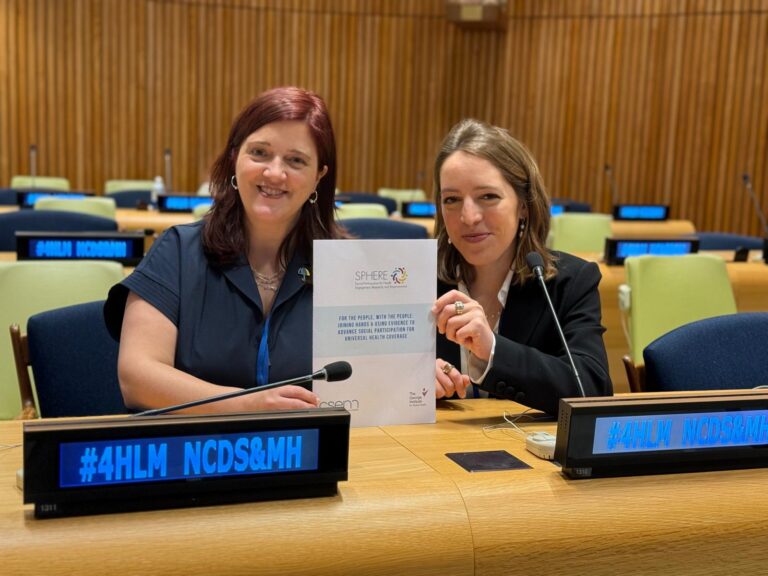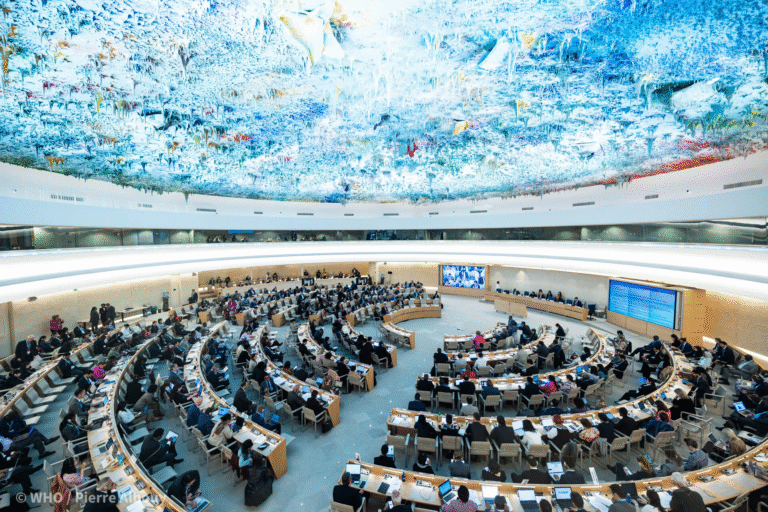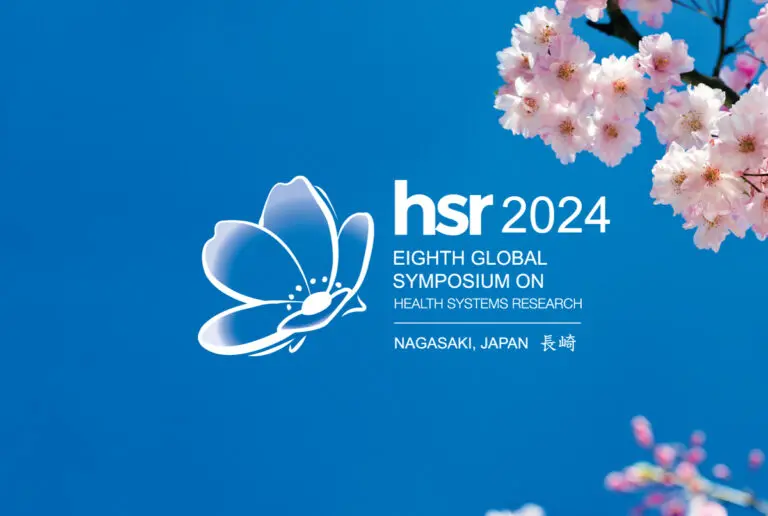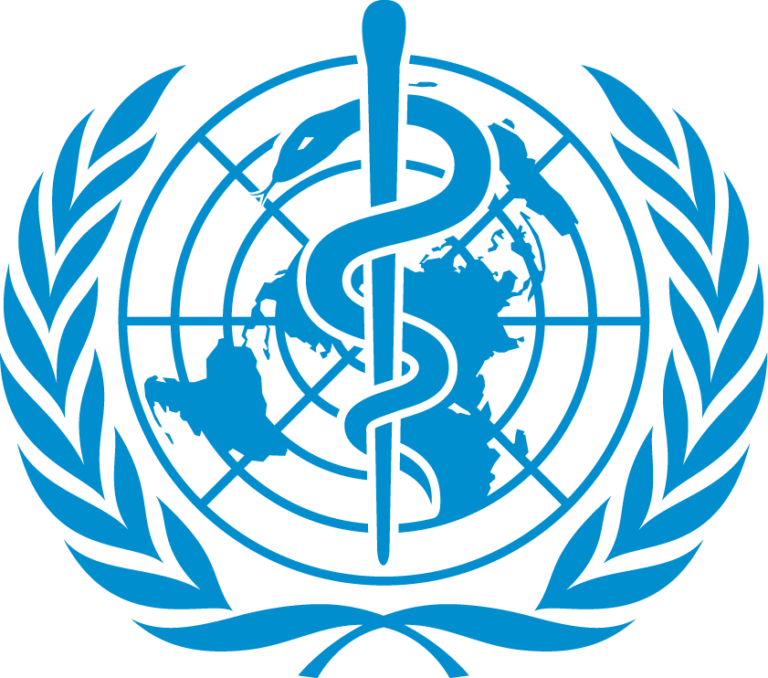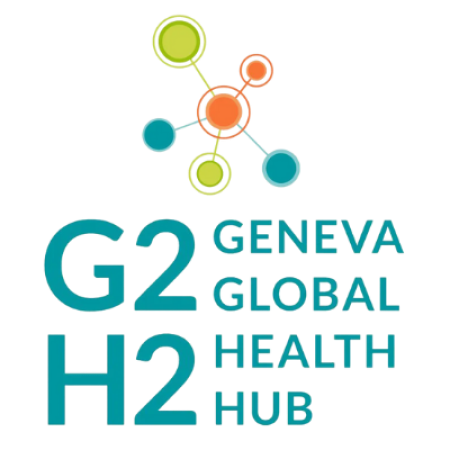The United Nations High-Level Meetings (UN HLMs) on Universal Health Coverage (UHC), the Fight Against Tuberculosis (TB), and Pandemic Prevention, Preparedness, and Response (PPPR) will take place in September 2023. At the HLMs, world leaders will debate and hopefully adopt ambitious and comprehensive Political Declarations with global commitments to accelerate responses for these health priorities.
On May 8th-9th, the president of the United Nations General Assembly (UNGA) is convening a series of multi-stakeholder hearings to provide an opportunity for relevant stakeholders (including civil society and non-governmental organizations, academia, the private sector and communities) to contribute to the preparatory process, with a focus on the current state of art, and key priorities that governments should take into account in future.
Members of the SPHERE consortium will be present, in anticipation of being called upon to deliver pre-registered statements that will inform the Zero draft of the Political Declarations. The statements submitted by SPHERE members Fundación Huésped, CSEM for UHC2030, and The George Institute for Global Health can be found below.
Statements registered by Leandro Cahn on behalf of Fundación Huésped
UHC
I am presenting this statement as the Executive Director of Fundación Huésped, an organization which since 1989 has worked for the rights of people living with HIV and populations at higher risk of HIV. Likewise, we are members of a group of organizations from the global South, which within the framework of the SPHERE collective, are working to coordinate actions to promote the effective participation of communities in promoting universal health coverage. For us, working for the sexual health of communities means working with communities to promote their participation. This high-level meeting is an opportunity to identify progress achieved and pending agendas with the States on the way to the 2030 goals, as well as to reflect on how to attain these goals. The participation of the most vulnerable populations—trans people, sex workers, incarcerated people, the LGBTI community—requires concrete efforts to build spaces for dialogue considering their needs and ensuring effective listening. These spaces must include their voices and be open to integrate their demands. We need to reduce discrimination barriers, and listening to the people facing them is the only possible channel.
PPPR
Those of us who have been working in the response to the HIV pandemic for more than 30 years have learned a few key lessons. There can be no progress in the response to HIV without the effective and meaningful participation of communities to identify the barriers which limit their access to health systems, and design adequate responses to promote their inclusion. The Covid 19 pandemic has reaffirmed this. The most vulnerable populations were most affected by COVID-19, and are still behind in access to vaccines in many communities. They should be at the center of our reflection. We must find a way to discuss health systems with them, to bring decision-makers closer together and agree, with the voice and leadership of community leaders, on a common language which allows us to incorporate their perspectives, and to identify challenges and build the answers. There is no effective future pandemics preparedness proposal without adequate social participation.
Statement registered on behalf of the Civil Society Engagement Mechanism (CSEM) for UHC2030
UHC
Health is a fundamental right of every human being, and it is the duty of governments to fulfill this right. While many countries have reduced barriers to health care and financial protection, inequality for vulnerable and disadvantaged groups has increased. This unequal impact will be exacerbated by ongoing crises, including climate change and conflicts. To make the right to health for all a reality, governments must:
1. Identify the most vulnerable groups by collecting disaggregated data and analyzing health status across gender, age, income, race, ethnicity, migratory status, disability, sexuality and geographic location, etc.;
2. Use disaggregated data to design equitable health programs, policies, frameworks and interventions that prioritize vulnerable and underserved populations and remove barriers such as discrimination and harmful social, traditional and cultural norms that prevent all population groups from receiving quality health services when they need them;
3. Provide a comprehensive health benefits package to ensure all people, particularly the most vulnerable, have access to quality health services that cover the full spectrum of care which includes promotion, prevention, treatment, rehabilitation, and palliative care;
4. Institutionalize and adequately fund social participation mechanisms for relevant stakeholders, especially civil society and vulnerable communities, to meaningfully engage in decision-making, implementation, monitoring and accountability processes that affect people’s health;
5. Increase and stabilize investments in health to make health systems more equitable and resilient.
In taking these actions to accelerate equitable progress towards universal health coverage, countries will benefit economically and socially because universal health coverage makes a significant contribution to reducing poverty, and promoting equity, social cohesion and resilience.
Statement registered by Shraddha Mishra on behalf of the George Institute for Global Health
UHC
I am presenting this statement as a youth representative, Master of Public Health student, and Secretariat member of the Consortium for Social Participation for Health, Engagement, Research and Empowerment, known as SPHERE.
Community participation is essential for developing responsive and equitable policies and programs, and realising the right to health for all. However, in some contexts, the space for social participation is shrinking. In others, efforts to promote social participation have actually reinforced inequities; for instance, when the timing and locations of public fora have hindered the involvement of some marginalized groups.
Together, we must document, reflect on, and draw lessons from past and existing participatory spaces to identify how people at the margins can be better involved, and how power can be meaningfully claimed by community members. SPHERE’s member organizations, including civil society, health and academic organizations, have already begun this work. But we cannot do it alone.
We call on governments to do three things.
The first is to institutionalize mechanisms for all civil society and community members—particularly women, people living in poverty, LGBTQIA+ peoples, and others who are marginalized and may have lived experience that matters for health—to participate meaningfully in health reform policymaking, implementation, and monitoring and accountability processes.
The second is to prioritize ongoing documentation and evaluation of past and current social participation mechanisms through research, to identify how such participation can be strengthened and made more inclusive.
And the third is to identify and eliminate barriers to the meaningful participation of those impacted by an issue, particularly those who are marginalized.
Only by doing so can we fulfill the potential of social participation in our path toward universal health coverage, health equity, and community well-being.
